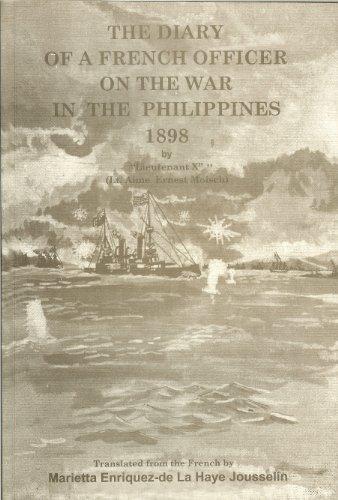The Germans
Their arrival is imminent. The American fleet is anchored between Cavite and Manila Bay. In the bay, an English warship, the Linnet, a small ship of 750 tons, will not remain much longer as England’s sole representative. Irene, the German cruiser, a rather sturdy ship of 4,400 tons, has just anchored. Its decks are well equipped with four 150mm guns and 10 of 105mm. But the Bruix undeniably remains the most imposing of them all. France would not send unworthy ships to parts of the world where the strength of their fleet is weighed against that of others. France can surely count on a Bruix or an Entrecasteaux, but what fate would await the officers and crew of the old wooden ships languishing in the Antilles in case war should break out without warning? What defense would a Fulton or Rigault-de-Grenouilly have against a well-armed ship with modern artillery? I hope the Bruix stays in the Orient long enough to show its prowess in China, Japan, and other countries. For political as well as economic reasons, we should have our presence felt everywhere. Where we sail the China Seas, we display a well-equipped, basically sturdy warship to the Celestes, the Japanese, and even to the Americans who are used to somewhat archaic ships like the Vauban, the Bayard, and the Duquay-Troiun. These foreigners often gauge France’s prowess according to the tonnage of her warships and take pride in their knowledge of our fleet’s strength.
The German cruiser gives a good impression of the imperial fleet. The sight of the black flag of the Empire lifts the confidence of the besieged, and there are rumors that Germany will play the role of arbiter here. Personally, I doubt it. I have not forgotten what I witnessed in Europe and Asia. Never has Germany taken sides against the strongest. The Germans initiated this type of political maneuver to put the stifling yoke on the world and its people.
Their version of peace has served only to maintain this yoke through the use of arms. I can still hear the words uttered by the German consul in China whose conversation between him and his French friend were repeated to me. The day after the occupation of Kiao-Tcheou, the Frenchman asked this person:
–So you Germans want war? Do your interests lie in China? What are your intentions?
The consul replied:
–I am telling you, there is no reason for us to stop. Time is on our side, and we intend to pursue our task. No one can stop us. We will not threaten anyone while we continually make progress. China is so vast that there is room for everyone. England has taken over the world. The policy of all these countries is directed against her, not against us, particularly in the Far East. Undoubtedly, it is a good idea. We have seized the opportunity while others have not. In the new markets which are opening up, we have first place, and in others, we are in second place as we wait to dislodge the English. We want to do business, not go to war. My dear friend, each year, peace is more useful to Germany than a glorious war. We shall not stop. I repeat: Events are working in our favor.
For no apparent reason, the Spaniards have too much trust in the Germans. They are waiting for the German squadron from China. In all probability, only two or three battleships will come to Manila, but these will neither defend Spain nor fight for the United States. However, Germany will let one side count on her, and make the other feel that it could perhaps depend on her. That way, she commits her friendly service to both –to the Americans for not doing anything, and to the Spaniards for what she could contribute. Here lies the great shrewdness of the Germans. The more the rest of Europe withdraws from Germany, the more she makes her presence felt. In the Far East, German is involved in everything, insinuates and makes herself visible everywhere. Without evident violence, she is assuming the roles of both France and England. She has set her eyes on the Carolinas, Tonking, and the Sunda Islands. She pretends to sympathize with each of these nations, as she secretly waits for them to show their good will by offering her one or two colonies.
The Spaniards have already forgotten the Carolinas affair, but we can be sure the Germans have not. The Spaniards obstinately counted on Europe up to the first day of war. They are counting on the Germans now that they are defeated. What a great misfortune it is when a country looks for support from outside, and is crushed because of this error. A nation should depend only on itself –it is the only thing that counts. Europe has betrayed Spain, and it is probably its biggest mistake. Germany has also betrayed her, but has profited from it.
There is nothing we can do. A conquered nation hopes in vain. I have heard it said that the Spaniards are convinced of William II’s intervention: the Kaiser does not want America’s wrath upon Europe, and he will resort to force if need be to keep the American peril out of Europe.
